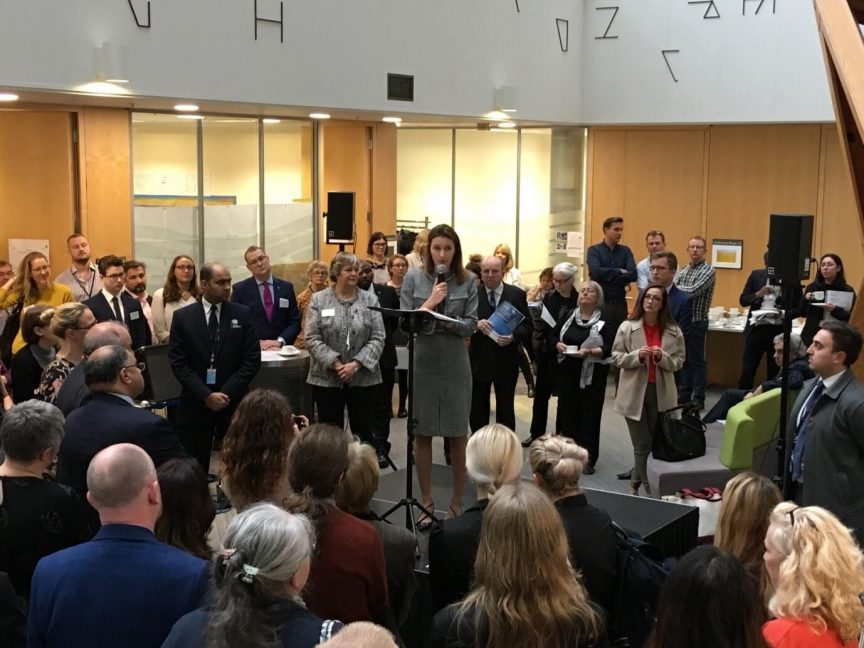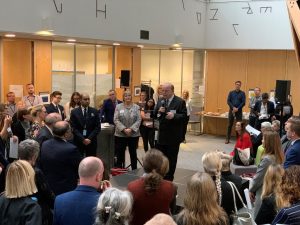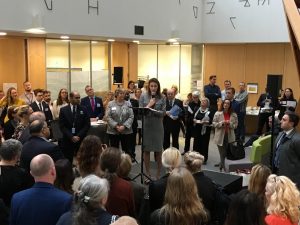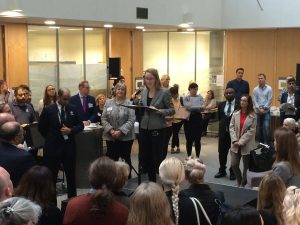Courts and tribunals service uk
Carmen Nadolu, Head of Membership at the IoP, has attended the HM Courts and Tribunals Service Public Event on Reform Update Autumn 2018 on 6th November and is delighted to share some of the key updates with our members:
HMCTS has hosted their second public event on 6th November, inviting those who represent public court users to see first-hand the progress public user organisations have helped them to make over the last year.
With both market stalls and hands on activity sessions available, over 160 participants were given the opportunity to engage with 27 project teams, attending across all jurisdictions.
The opening addresses was given by Justice Minister Lucy Frazer, Sidonie Kingsmill HMCTS Customer Director, and The Hon. Mr Justice Knowles.
Lucy Frazer said: ““Why reform? We are in the midst of a technological revolution… The judiciary have long called for the digitisation of our court system. Our justice system has always moved with the times. We should not be afraid of progress and change. Our justice system will remain as open and transparent as it is now. The public & media will continue to see, hear and read about hearings and judgements. The physical courtroom & face-to-face interactions will continue to play a critical role.”
Sidonie Kingsmill said: “We need you to use every tool at your disposal to ensure we use this investment to improve the justice system, so that it is more accessible, more proportionate, and of course, just. Only by being open-minded – literally & metaphorically – will we stay true to the central guiding principle: that we should put the person using the system at the centre of the way it works.”
The Hon. Mr Justice Knowles said: “We have a justice system that the world looks up to. But that system has grown inaccessible to many. There is much to see today that is to be celebrated. It is work in progress and does not claim to be more. So, think how good it can be. Think what you can bring to it. This is our chance to make our justice system accessible to many.”
Background:
The reform programme was launched in 2016 with a joint statement from the Lord Chancellor, the Lord Chief Justice and the Senior President of Tribunals.
HMCTS is responsible for the administration of criminal, civil and family courts and tribunals in England and Wales – and non-devolved tribunals in Scotland and Northern Ireland. They handle about four million cases a year, operate from around 350 courthouses and hearing centres and employ more than 16,000 people, most of whom are frontline, operational staff.
Their reform programme spans the full range of their work and is undeniably ambitious. There are more than 50 distinct projects (outlined in the projects summary) working across all jurisdictions (in criminal, civil, family and tribunals), and they are investing more than £1bn over six years. This is, without a doubt, an historic opportunity to make a system we all care about deeply work better.
The potential for a system where effectiveness for the individual citizen and efficiency for the taxpayer go hand-in-hand is there. Designing these processes around the citizens who need them makes the system less forbidding, more considerate of others’ time and convenience, as well as more efficient.
In doing so, the hard-working, dedicated and deeply committed to justice HMCTS’ employees, make sure they continue to uphold the principle of open justice, which is vital to the justice system in the UK.
Progress:
During the first phase of the reforms, HMCTS has focused on testing the basics behind the plans:
- testing early digital services (versions of the divorce, probate and online plea services, for instance); • started to create national teams to deliver more consistent service (such as call handling);
- put in infrastructure (including more Wi-Fi);
- started less visible, but important work to prepare for the next phase (procurement work, location analysis, leases for buildings, demand modelling, design work and so on).
In the current second phase, they are starting to make these first services available to more people:
- starting work on their equivalents in other parts of the system (public family law, for example);
- building ‘enabling’ services (such as video connections and technology to support listing);
- standing up more national ways of working that give the public more responsive and consistent service (such as case tracking and answers to questions about what will happen next).
If you are interested in finding out more these reforms, please see the electronic version of the HMCTS’ Reform Update 2018 here.
Carmen Nadolu
Head of Membership






